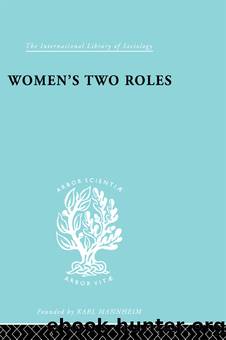Women's Two Roles by Viola Klein Alva Myrdal

Author:Viola Klein, Alva Myrdal [Viola Klein, Alva Myrdal]
Language: eng
Format: epub
ISBN: 9780415176576
Goodreads: 13709048
Publisher: Routledge
Published: 1998-01-29T00:00:00+00:00
What immediate Improvements are Possible?
A discussion of the social reforms which will be necessary before women can pull their weight in industry, commerce and the professions, will be found in a later chapter. Here we shall consider what can be done under present conditions to improve the productivity of female labour.
We cannot do better than quote once more the pamphlet on The Problem of Absenteeism by the Ministry of Labour and National Service. âIt would be of advantage for managementsâ, it states, âto recognize frankly that many workers, especially women, cannot be expected to work five-and-a-half days per week, or long hours, week in week out, if they have to spend in addition two to three hours a day or more on travelling, possibly by a crowded bus or train and in all weathers, or if they have homes and young children to look after. Much could probably be done by redistributing the work and/or the labour force in the factory so that those who need special working hours would be so employed as not to disorganize the work of others. It might be possible, alternatively, in the case of women, to arrange a rota system whereby each worker has one day off per week apart from Sunday. This latter arrangement would clearly be of value to married women especially.â
This was written during the war. No doubts existed then in peopleâs minds about the value of womenâs contribution to the national effort. Clearly, women were needed, and all possible efforts were made by the Government, by local authorities and by employers to enable them to accept jobs outside their homes. With the approach of peace the attitude to this question became much more half-hearted. Men, in particular, seem to have watched the new development with mixed feelings. They were influenced, partly, by fear of feminine competition during the coming era of uncertain economic development, and partly by their desire to have full-time wives at home.
A sidelight on this attitude was cast by the Man-Power Debate of September 1943 in the British Parliament. The Government had proposed a Bill to call up women between the ages of 45 and 51 for National Service. This question caused a great stir in public opinion and the press, and feelings ran high. But the Debate in the House of Commons revealed an interesting division between the sexes: only among the men were voices heard which conjured up a mother image and waxed sentimental over the home-makers who âcarry the main burdenâ and do âthe superb job of keeping the homes of this country togetherâ, etc. All the women M.P.s supported Mr. Bevinâs Bill; Eleanor Rathbone, herself a venerated and venerable woman leader, even came out in favour of recruiting women up to the age of 65.
The divided mind on the question of womenâs employment shows itself in the half-hearted measures taken after the end of the war to make it easier for married women to accept outside work. True, in all the Western countries some arrangements have been made to accommodate the work of women to their particular needs.
Download
This site does not store any files on its server. We only index and link to content provided by other sites. Please contact the content providers to delete copyright contents if any and email us, we'll remove relevant links or contents immediately.
The Secret History by Donna Tartt(19089)
The Social Justice Warrior Handbook by Lisa De Pasquale(12190)
Thirteen Reasons Why by Jay Asher(8910)
This Is How You Lose Her by Junot Diaz(6887)
Weapons of Math Destruction by Cathy O'Neil(6280)
Zero to One by Peter Thiel(5802)
Beartown by Fredrik Backman(5754)
The Myth of the Strong Leader by Archie Brown(5508)
The Fire Next Time by James Baldwin(5446)
How Democracies Die by Steven Levitsky & Daniel Ziblatt(5219)
Promise Me, Dad by Joe Biden(5153)
Stone's Rules by Roger Stone(5088)
A Higher Loyalty: Truth, Lies, and Leadership by James Comey(4964)
100 Deadly Skills by Clint Emerson(4925)
Rise and Kill First by Ronen Bergman(4789)
Secrecy World by Jake Bernstein(4753)
The David Icke Guide to the Global Conspiracy (and how to end it) by David Icke(4720)
The Farm by Tom Rob Smith(4513)
The Doomsday Machine by Daniel Ellsberg(4490)
